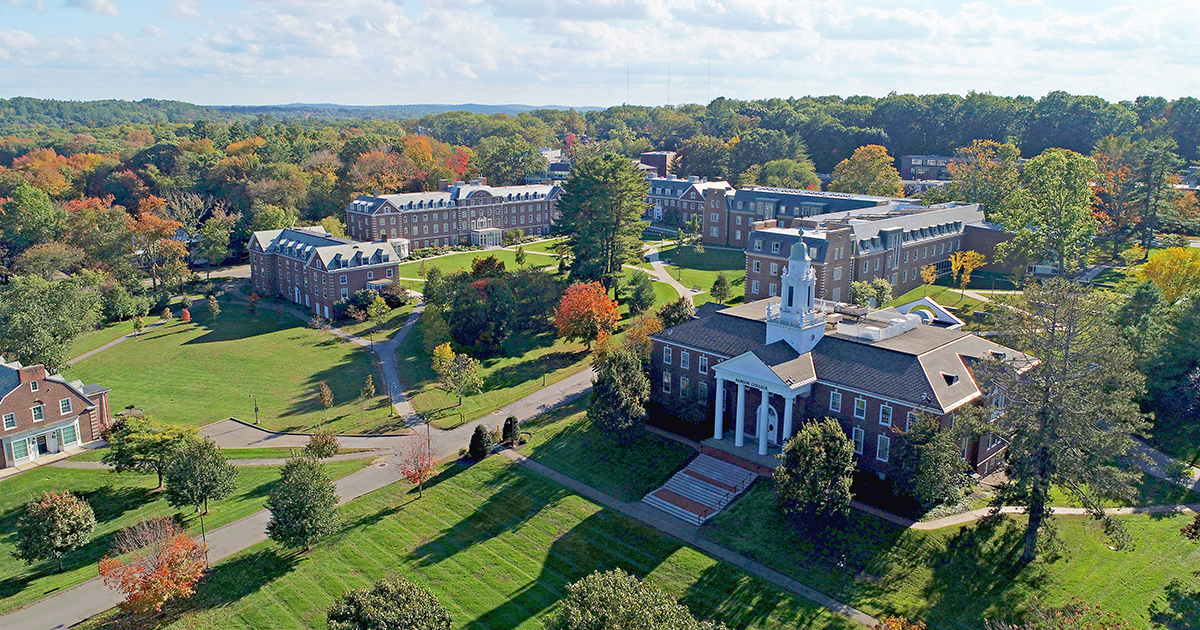Top-Ranked Babson College Keeps Focus on the Future

The fall semester at Babson College brings with it certain rituals and experiences we’ve come to expect: students moving into their residence halls, classes starting, friends reuniting.
For more than two decades, those fall expectations also have included something else: a prestigious recognition.
Today, that recognition has happened once again. For the 25th consecutive time, U.S. News & World Report has named Babson the No. 1 undergraduate school for entrepreneurship. The honor recognizes the College’s ongoing leadership and innovation in entrepreneurship education.
To be recognized 25 times—that’s a long stretch of being at the forefront.
“This is a moment of pride and celebration for the Babson community,” says President Stephen Spinelli Jr. MBA’92, PhD. “To be No. 1 for so long is a significant accomplishment.”
Not that Babson is a place prone to complacency, adds Spinelli. Less than two years ago, Babson announced the creation of The Arthur M. Blank School for Entrepreneurial Leadership. A significant investment and milestone, the Blank School is at the forefront of Babson’s expanding focus to advance entrepreneurial leadership and achieve the College’s mission of empowering students to create lasting economic and social value in their communities and the world.
In the midst of what was a challenging year for higher education, the College continued its forward momentum, with a new institute, a new research grant program, a new core curriculum, and new thought leadership, including the latest U.S. Global Entrepreneurship Monitor (GEM) report.
“We have seen great success, but we are always looking ahead,” Spinelli says. “The world needs entrepreneurial leaders to take on the many challenges we face in the future, and we must make sure they’re ready.”
News from the Blank School
The last year has brought a number of notable accomplishments for Babson’s unremitting work in entrepreneurship and entrepreneurship education.
One major highlight was the launching of the Tariq Farid Franchise Institute at Babson College. Created through the generosity of Tariq Farid P’15 and his family, including Somia Farid Silber ’15, the institute resides in the Blank School and fills a growing need for franchising education.
The institute provides: transdisciplinary undergraduate, graduate, and certification-level courses; a world-class advisory council; and a multidisciplinary faculty research program. Few other institutions offer such programming, even though franchising accounts for more than $674 billion of business conducted annually in the United States.
“We have seen great success, but we are always looking ahead. The world needs entrepreneurial leaders to take on the many challenges we face in the future, and we must make sure they’re ready.”
Babson President Stephen Spinelli Jr. MBA’92, PhD
The institute wasn’t the only news emanating from the Blank School, which was established thanks to a $50 million gift by Arthur M. Blank ’63, H’98 and The Arthur M. Blank Family Foundation and seeks to build entrepreneurial leaders with empathy, morality, and compassion. In April, the Blank School launched a new scholarship funding opportunity—the Faculty Research Angel Fund—to support promising research from full-time faculty.
After reviewing the proposals it had received during its inaugural year, the fund decided to support a team of professors looking at healthcare entrepreneurship. Under the project title of “Investigating Healthcare Entrepreneurship: Financial Well-Being, Equity, and Social Determinants of Health,” their work has potential implications for global healthcare practice and policy.
A Glimpse at GEM
Recent months have seen an old friend return to campus. Double Beaver Jeffrey P. Shay ’87, MBA’91 has come back to his alma mater to be part of the Blank School’s leadership team. With experience as an academic leader and entrepreneur, Shay is serving as the school’s executive director for academic operations.
Additionally, he is co-leading the U.S. GEM team with longtime Babson entrepreneurship professor Donna Kelley P’24, who also is finding herself in a new role, having been named chair of the Entrepreneurship Division. Kelley also is the Frederic C. Hamilton Professor of Free Enterprise Studies.
GEM’s research has long offered a portrait of the lives of entrepreneurs. In its latest report, GEM gives a snapshot of a tumultuous moment in time, providing a comprehensive look at the impact COVID-19 had on entrepreneurs and business owners six months after the pandemic began disrupting American life and business.
Yes, times were difficult, but the report found that entrepreneurship still flourished, with 54% of entrepreneurs and 43% of business owners reporting that the pandemic introduced new business opportunities. In fact, in 2020, one-half of entrepreneurs said they were motivated to start a venture because jobs were difficult to find, representing a 22% increase from 2019.
“The world never stops changing and evolving, and neither do we.”
Babson President Stephen Spinelli Jr. MBA’92, PhD
An Evolving Curriculum
Meanwhile, as Babson continually examines how to best prepare its students for the future and develop entrepreneurial leaders, it has taken a long look at its curriculum. This fall, it is implementing a new core undergraduate curriculum that will include an added emphasis on sustainability and experiential learning, both of which have been a focus at the College for a long time.
All undergraduate students begin their journey with the award-winning, first-year Foundations of Management and Entrepreneurship (FME), Babson’s signature course, which continues to evolve and adapt to provide students with tangible, hands-on experience in starting and running a new business.
Every sophomore then will take a sustainability class, Socio-Ecological Systems, that will ask them to consider the far-reaching implications of human behavior and how it is impacting communities and the world we live in. Additionally, students will finish their time at Babson with an Advanced Experiential requirement, a semester-long project with a company or nonprofit, providing valuable leadership experience from inside an existing organization.
Taken together—the new curriculum and institute, the ongoing and important research—and you’re left with a portrait of an institution that’s never standing still, even as it has been recognized many times over for its accomplishments. “The world never stops changing and evolving,” Spinelli says, “and neither do we.”
Posted in Community




